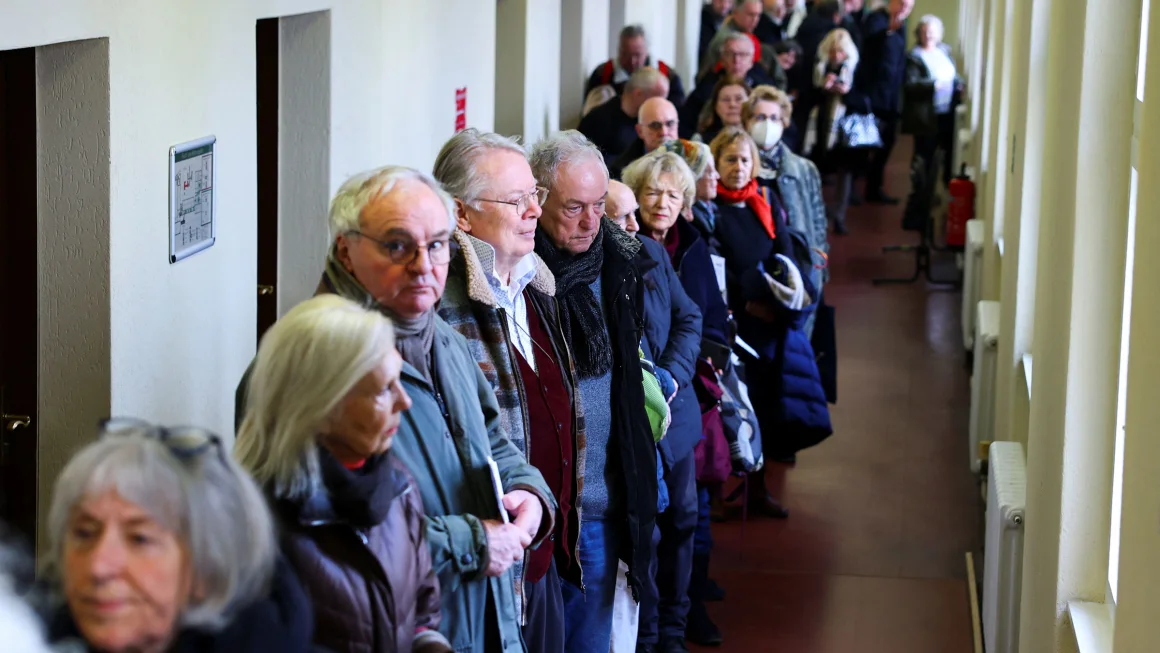Voting opened Sunday in a German general election that opinion polls suggest will bring a new chancellor and a new governing coalition.
The country’s elections are often a little dry and predictable, but this campaign has been eventful by comparison.
Last November, Chancellor Olaf Scholz of the Social Democratic Party (SPD) unceremoniously fired his finance minister. Scholz then lost a vote of confidence, triggering early parliamentary elections.
Shortly afterwards, Elon Musk, the world’s richest man and a confidant of the Trump administration, waded into the campaign, voicing his support for the far-right Alternative for Germany (AfD).
Musk’s intervention sparked a national debate about how Germany remembers its own 20th-century history. The chancellor called Musk’s support for far-right politicians in Europe “disgusting.”
Tech billionaire Elon Musk speaks via a video transmission during the election campaign launch rally of the far-right Alternative for Germany party, in Halle, Germany, on January 25, 2025.Sean Gallup/Getty Images/File
The AfD for its part is likely to break new ground in German politics, with opinion polls suggesting it may become the second-largest political group in the country – a first for a far-right party since the Nazi era.
Two key themes have dominated campaigning: curbing mass migration and righting the country’s flailing economy.
Who are the main candidates for chancellor?
The candidate for chancellor of Germany’s Christian Democratic Union party Friedrich Merz speaks during the TV program “Klartext,” hosted by public broadcaster ZDF in Berlin on February 13, 2025.Michael Kappeler/Pool/AFP/Getty Images
FRIEDRICH MERZ
Friedrich Merz of the Christian Democratic Union (CDU), the party of former Chancellor Angela Merkel, has been the longtime frontrunner in this contest. Regularly polling at more than 30 percent, the Union party – composed of the CDU and its Bavarian sister party, the CSU – seems destined to be Germany’s largest party and return itself to the helm of German politics.
The CDU has adopted a much more aggressive policy towards immigration than seen in the Merkel era of open borders.
In the final weeks of campaigning, Merz catapulted immigration to the fore – so much so, that he has been accused of leaving the door open to working with the far-right.
In late January, he caused nationwide consternation when he sought to push legislation imposing stricter controls on immigration through the Bundestag, or German parliament.
His willingness to use the support of the AfD to do so broke a long-held taboo in German politics – although he ultimately failed to pass a binding bill – and prompted massive protests in German cities.
In an interview at his party congress in early February, however, Merz reiterated to CNN that working with the AfD was a non-starter. “They are against… everything (that) we are, what we build up in the Federal Republic of Germany. There is no co-operation with this party,” he said.
Merz is not a newcomer to German politics, but this is his second iteration as a politician.
Between 1989 and 1994, Merz was a member of the European parliament (MEP) for Germany. He subsequently became a member of the Bundestag, representing the CDU there until 2009. He then left politics to work as a corporate lawyer, where he sat on many supervisory boards, including at investment giant BlackRock.
He now represents his hometown of Brilon and is widely reputed to be a millionaire with a private pilot’s license.
He made two failed attempts to become CDU head, in 2018 and 2021. He officially took over as head of the party in 2022.
Co-leader of the far-right Alternative for Germany party Alice Weidel gestures as she talks with citizens during the TV program “Klartext,” hosted by the public broadcaster ZDF in Berlin on February 13, 2025.Michael Kappeler/Pool/AFP/Getty Images
ALICE WEIDEL
The AfD’s candidate for chancellor, its co-leader Alice Weidel, is staunchly anti-immigration.
The AfD had a successful 2024, performing strongly in regional elections. It became the largest party in Thuringia, a first since the Nazi era, and came a close second in another regional vote.
Opinion polls suggest that popularity has translated to the national level too. The party has been polling in second place, with around 20 percent, since the snap election was called and the figures have hardly budged.
Speaking to CNN at a huge rally for the AfD, at which Musk appeared by video link, Weidel said one of her first acts as chancellor would be “closing our borders, controlling them and then sending out all the illegals.” It’s a policy she calls “remigration” – a term that has Nazi connotations.
Read More Details
Finally We wish PressBee provided you with enough information of ( Germany is holding a national election. Here’s what’s at stake )
Also on site :
- Broncos agree to terms with ILB Jordan Turner, WR Kyrese White after rookie minicamp tryouts, sources confirm
- Celtics' Jayson Tatum Exits Game 4 vs Knicks With Concerning Non-Contact Injury
- Inside Kylie Jenner and Timothée Chalamet's $22,000-a-Night Hotel Room During Recent Rome Trip: Source (Exclusive)

